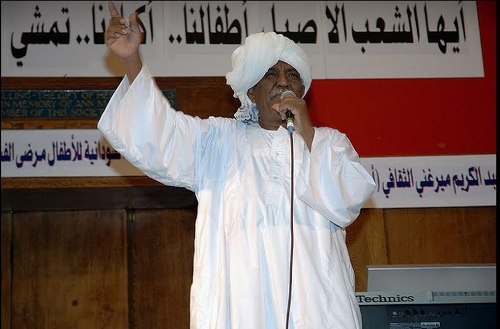Memories from my undergraduate degree at the University of Khartoum back in Sudan remain vivid: attending lectures, working at the Science Students Association, having tea at Siyama’s place, passing affectionate couples on Nile Street and enjoying heated political debates on the main street’s discussion corners.
In every little memory of every single scene, one would hear a song, recognize a poem or see a phrase by Mahjoub Shareef, a Sudanese poet, who sadly died earlier this month, at the age of 66, after a long illness.
An influential figure in Sudanese history, Shareef found his way to people’s hearts by making his poetry part of everyone’s daily life and rhythm.
His poems describe scenes of working mothers preparing breakfast for their children before heading off to work, of builders lining bricks for a new house, of teachers using chalk on blackboards, of friends catching up over a tea break and of lovers beneath trees whispering their hopes for a new life.
Shareef was known for his leftist beliefs and strong sense of human rights.
He survived difficult conditions, especially after the Islamists took power in 1989 and attacks on the arts and secular cultural reached their climax. The 13 years he spent in jail during different periods of dictator governance did not cause his cheerful spirit to fade. Instead, he painted Sudan’s struggles in a colourful light and paved the way to a brighter future.
He wrote and popularised national songs and was a key figure in reviving political poetry.
Many of his poems, sung by singers such as Mustafa Sid Ahmed and Mohamed Wardi, and popular bands, such as Igd Algalad, became virtual anthems for the civil rights movement in Sudan.
He reached wider regional and international audiences with his simple but powerful messages.
Egyptian singer Mohamed Monir sang his famous Al shab Habibi w Shiryani (The Nation Is My Love and My Blood), which became a regional hit in 2001. He also toured around Europe, performing at big events in the UK, the Netherlands and other countries.
Shareef had a positive outlook and a strong belief in a better Sudan.
He co-founded the charity, Rd al Jameel (Give Back), which helps marginalised individuals in need of jobs and equipment. Children were his focus due to his background as a primary school teacher and with working with younger generations.
He published a collection of poems in a book titled The Children and the Soldiers in 1986 and initiated Nafag (The Path), a programme which inspires and empowers children through the arts. He also worked closely with many cultural associations in Sudan including cultural centres such as Abdel Kareem Mergani and other student unions.
Despite the country’s loss, it is evident that Shareef has not actually left us but is still in the hearts of everyone who has ever known him.
We are privileged to have witnessed an era in which he was instrumental and influential in so many ways. Shareef changed mindsets and redefined possibilities. He brought out hope in every hug, every pencil and every cup of tea.
Mahjoub Shareef is certainly not a person for whom to shed tears, but rather someone to be proud of and celebrate.
Love elephant and want to go steady?
Sign up for our (curated) daily and weekly newsletters!
Apprentice Editor: Carrie Marzo / Editor: Travis May
Photo: Courtesy of author












Read 0 comments and reply